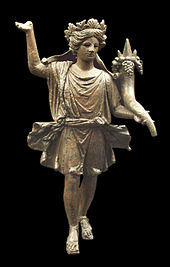Laren
The lares ( Latin Lares ; singular Lar ) are the protective gods or guardian spirits of certain places and families in the Roman religion .
The Lares Familiares , together with the Penates, were the family's guardian spirits and symbolized the household. They have been equated with the deified souls of their deceased ancestors. They were venerated at all family celebrations and accompanied the family when they left. The cult probably goes back to primeval house burials. The comedy poet Plautus can be characterized as follows: “I am the Lar familiaris of the house from which you saw me step out. I've owned and looked after this house for many years, already for the father and grandfather of the one who lives in it now ”. He goes on to say that he is venerated by the daughter of the house and that he receives daily offerings from her.
The Lares Loci , on the other hand, were the guardian spirits of a certain place. In the Lararium , the Lares Loci where a house was built were represented and venerated by one or more snakes. Lares Loci were stationary, which means they did not move with the residents of a house.
Lares Publici were the guardian spirits of entire towns. In central Italy they were also called Lares Compitales in the towns and Lares Paganales in the villages . Lares were also guardian spirits of public places and crossroads , which according to common belief were dangerous. In ancient Rome there was a shrine dedicated to them at every intersection. This task was taken over by the so-called stations of the cross .
Lares were male and very fertile. Her female partners were the Virae . The worship of the Lares and Penates was forbidden on November 8, 392.
The Lar is the title of a novel by Wilhelm Raabe from 1889. Rainer Maria Rilke published the volume of poems Larenopfer in 1895.
literature
- Fritz Böhm: Lares. In: Paulys Realencyclopadie der classischen Antiquity Science (RE). Volume XII, 1, Stuttgart 1924, Sp. 806-833.
- Burkhart Cardauns : Lar (Lararium). In: Real Lexicon for Antiquity and Christianity . Volume 22, Hiersemann, Stuttgart 2008, ISBN 978-3-7772-0825-1 , Sp. 978-989
- Harriet I. Flower: The Dancing Lares and the Serpent in the Garden. Religion at the Roman Street Corner. Princeton University Press, Princeton / Oxford 2017, ISBN 978-0-691-17500-3 .
- Attilio Mastrocinque: Laren. In: The New Pauly (DNP). Volume 6, Metzler, Stuttgart 1999, ISBN 3-476-01476-2 , Sp. 1147-1150.
- Vincent Tran tam Tinh : Lar / Lares . In: Lexicon Iconographicum Mythologiae Classicae (LIMC). Volume VI, Zurich / Munich 1992, pp. 205–212.
- Georg Wissowa : Lares . In: Wilhelm Heinrich Roscher (Hrsg.): Detailed lexicon of Greek and Roman mythology . Volume 2.2, Leipzig 1897, Sp. 1868-1897 ( digitized version ).
Web links
supporting documents
- ↑ Plautus: Aulularia , Prolog 1–5
- ↑ Codex Theodosianus 16,10,12.

